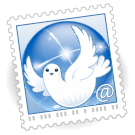

Sofftware
Applications
Web Browsers
Mozilla-Firefox: This popular web-browser is taking the world by storm, and it represents a serious competition to MS Internet Explorer. This free web-browser, released under three free licenses (GNU General Public License, GNU Lesser General Public License, and Mozilla Public License) forms part of the Mozilla Project. This project was created by Netscape initially as a way of perfecting Netscape's web suite through a Mozilla Application Suite. Later, it created an independent standalone web browser, first named "Firebird", and now called "Firefox". Now the Mozilla Project is supervised by the Mozilla Foundation. It is more advanced than MS Internet Explorer in security and display. As every free software project it is developed by a community of programmers, which essentially guarantees that the software is secure, is high-quality, and does not contain malicious software. It has many characteristics which makes it practically one of the best browsers in the market: spell checking, search suggestions, session restore (God bless the people of Firefox for this AMAZING feature!), web feeds, live titles, integrated search (you can search with Google, Yahoo, Amazon.com, Answers.com, CreativeCommons, and eBay), Live Bookmarks, Pop-Up Blocker, among others. It has other features that are extremely useful, for example: private browsing, phishing protection (additional protection of identity theft), automated update, protection from Spyware, clearing private data, and other very useful features. It is available for MS Windows, GNU/Linux, FreeBSD, OpenSolaris, Mac, among other operative systems.
Gnuzilla and Icecat: The GNU Project created an alternative to Mozilla Application Suite called "Gnuzilla", and an alternative to Mozilla Firefox that is called GNU Icecat, which are now being developed. The GNU Project created this for ethical reasons: while Firefox and Mozilla is free software, the binaries include non-free add-ons. To guarrantee the binaries are completely free, the GNU Project created Gnuzilla. GNU Icecat is the Firefox based free browser and operates just the same, but without the proprietary components.
SwiftWeasel: This is a freer version of Mozilla-Firefox, but without all the tradmark problems that Mozilla products have in general. SwiftWeasel is an enhanced version of Firefox, much faster, and with some free plugins, such as AdBlock Plus, a product available under the GNU GPL. Since, this does not have the tradmark problem, making it 100% free software.
Chromium: This browser is the code basis of the famous Google Chrome. Unlike Chrome, though, it is completely free software whose components are under free licenses. It is also the basis for the future release of Chromium OS, the code basis for the future Google Chrome OS, an operative system that will run on top of the Linux kernel. It is a fast browser, very easy to use, very light, but high quality rendering software. This is due mostly because of the use of WebKit. It has passed the Acid2 and Acid3 tests, and abides by W3C standards. Unlike Firefox and Firefox-based browsers, it is easier to open a new tab or detatch it from the main window, and its universal bar is a gem. I also like the fact that it has private browsing mode.
Konqueror: This is an amazing free web browser that is available for GNU/Linux, FreeBSD, OpenSolaris, and other Unix-like operative systems. It is a browser that is embedded in the K Desktop Environment (KDE) available for these platforms. Konqueror is simply an extraordinary browser that serves also as a File Manager and Document viewer (for example, in the case, of TXT, RTF or PDF formats). Its display is amazing, and was the first of free browsers to comply with the Acid2 test. It also has many features such as Pop-Up Blocking, Tabbed Browsing, Search feature, integrated search (specifically with Google), password security (with kwallet), among others. Now, thanks to advances in KDE, it is also available for Windows XP, Vista and Windows 7. It uses the KHTML browser engine, but in the future it will move to Webkit, which is a KHTML fork.
Arora: This is perhaps one of the prettiest, fastest and reliable web browsers you can ever find. It is based on Qt toolkit, and uses QtWebkit as layout engine, which is based in both Qt and Webkit. It fully complies with the Acid2 and Acid3 tests, and tries to comply with web standards. It does not have all the capabilities of the web browsers that you see above, but it is a nice browser.
Epiphany: This browser is only available for those using GNU/Linux, or other Unix-like operative systems that can run GNOME Desktop Environment. It deserves a mention, because I am impressed by it. For years, Epiphany ran using Mozilla's Gecko as layout engine, but now that it has moved to Webkit, it is better than ever. It uses a universal bar instead of Firefox's usual separate search engine and URL bars. It is very fast. It has some free extensions that, when added it guarantees more security and performance for users. The only thing I would ask them is detachable tabs and private browsing. Add those two, and it will be my favorite browser for life!
Mail Clients
Mozilla-Thunderbird: This program is a stand-alone mail client which used to form part of Mozilla's Application Suite. It is excellent and very effective in such things as junk mail identification and filter, anti-phishing protection, security, and automatic updates. Since its code is free, under the same licenses as Firefox, it is being developed by a community.
I personally use it along GNU Privacy Guard (GnuPG), a free implementation of OpenPGP, and lets people encrypt or sign digitally data communication in TXT format. For Windows users, WinPT is a graphical frontend for GnuPG, and helps to generate key encryption. The program that lets Thunderbird interact with GnuPG is called Enigmail, which makes key-creation and e-mail encryption extremely easy.
For those who are more used to MS Outlook for calendar, you can also use it as an add-on to Thunderbird (Mozilla Lightning), or as standalone (Mozilla Sunbird).
The Debian group will also create another program based on Thunderbird which will be called IceDove.
SwiftDove: It is a free alternative to Mozilla-Thunderbird. Thunderbird is free software, but its trademark policies have made difficult to create small changes and still call it "Thunderbird". SwiftDove is a 100% free alternative to Thunderbird, and integrates Lightning, a free calendar that can be integrated to both Thunderbird and SwiftDove. I now use it with GnuPG and Enigmail. It is an amazing software.
Web Editors
KompoZer: This is an excellent web editor based on Nvu, which was formerly supported by Fabien Cazenave. It has enhanced and corrected many features of Nvu. Nvu itself was based on the code of Mozilla-Composer, but the project closed in 2005 with version 1.0. KompoZer manages CSS, and is easy to use. Its HTML code is usually clean, and if not, you can always check if it is W3C HTML 4.01 standard, a feature inherited from Nvu.
Office Suites and Programs
OpenOffice.org: This is perhaps the best free replacement to MS Office. It is the free and open source version of StarOffice, a proprietary office suite developed by Sun Microsystems. OpenOffice.org is available for MS Windows, Mac OS, GNU/Linux, FreeBSD, OpenSolaris, and other operative systems. It uses the Open Document Format (ODF), an OASIS standard, as its native format. It has a word processor (OpenOffice.org Writer), it has a spreadsheed program (OpenOffice.org Calc), it has a presentation program (OpenOffice.org Impress), a database program (OpenOffice.org Base), a vector-drawing program (OpenOffice.org Draw), and a math editor (OpenOffice.org Math). It can read and save in DOC format (the format of MS Word) as well as other MS Office formats (although I recommend the use of ODF). Another very important feature of OpenOffice.org is that it exports reliably all documents to PDF format. This has been very useful for me, especially for making essays and e-books available for download. This Office suite is available under the GNU Lesser General Public License.
KOffice: KOffice is a free office suite freed under the GNU GPL, the GNU LGPL, and the BSD licenses. It consists in several components: KWord (the word perfect component), KSpread (the spreadsheet program), KPresenter (the presentation program), Kexi (a data management program to design and implement databases), Kivio (a flowchard drawing program), Karbon14 (a vector drawing program), Krita (an image manipulation program), Kugar and KChart (chart creation programs), KFormula (a math editor), and KPlato (a project management program).
The most recent version 2 is still in development, but most of the components are fully functional. It works very well in GNU/Linux and Unix-like operative systems, but it can be available to MacOSX and Windows operative systems.
LyX: This is a program that is related to the use of LaTeX, a programming language to export documents. LaTeX is used by most scientific and mathematical journals today. LyX is WYSIWYM (what-you-see-is-what-you-mean) document processor that lets authors export mathematical and scientific valuable material to LaTeX, PostScript, and PDF formats. This professional program is available under the GNU General Public License.


Linux Special Interest Group













